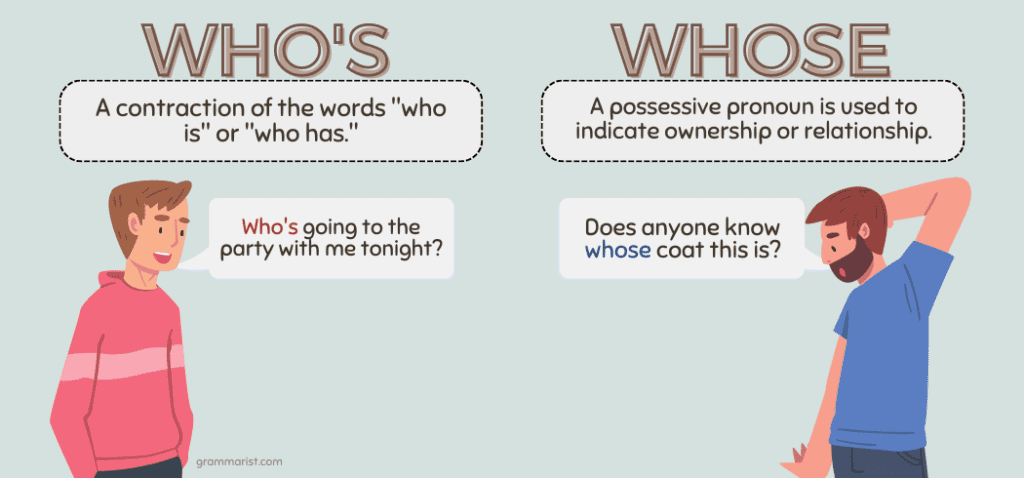If you’ve ever mixed up the words “whose” and “who’s,” then you’re in the right place. As a grammar ninja, I’ve seen many people misuse these two words, placing them in the wrong contexts and creating incorrect punctuation. So, I’ll take a second to explain the difference between “whose” and “who’s,” plus show you some tricks so you’ll never restrict the flow of writing again.
Difference Between Whose vs. Who’s: Basic Writing Mistakes
To me, it’s easy, but only because I use words like these every day. Plus, I taught myself a little trick to remember the difference. Just know that “whose” is a possessive noun you’d assign to a single person. But “who’s” is a contraction, usually used in the form of a question, but it can also be used in a statement.
- Whose: Whose is a possessive pronoun used to indicate ownership or relationship.
- Who’s: Who’s is a contraction of the words “who is” or “who has.”
The way I remember is by focusing on the contraction “who’s” and seeing it for what it is, a combo of who and is or who and has. This helps me decide if it’s the correct form to use in the context I’m using.
Take the sentence, “Whose mess is this? Come clean it up.”
It asks a question, but “whose” suggests ownership, as in who owns this mess. If you used “who’s” in this context, you’d be saying, “Who is mess is this?” which doesn’t make sense at all.
When to Use Whose
“Whose” should be used to show when there’s possession or a relationship between two or more people or things. You can use it to refer to people or animals, or even objects. For the most part, you’re supposed to use “whose” when you need to express a possessive relationship or ownership over anything.
How to Use Who’s
You should use the word “who’s” when you want to abbreviate “who is” or “who has.” It always functions as a contraction in a sentence, which makes it more concise and easier to read.
Whose House or Who’s House?
This is a super common question I see all the time and a simple mistake I’ve fixed in several documents I’ve edited for writers over the years.
- Whose House: This is the correct form. You use “whose house” to refer to the owner of a house.
- Who’s House: This is not correct. Remember, “who’s” is a contraction for “who is” or “who has,” not a possessive pronoun. So, if you said, “Who’s house,” you’d be saying, “Who is house.”
Whose Parents or Who’s Parents?
- Whose Parents: Go with this version! Always use “whose parents” when you’re indicating the relationship between a person and their parents.
- Who’s Parents: Again, because this is a contraction, you’d be saying, “Who is parents,” which doesn’t even make sense.
Is It Whose or Who’s Birthday?
If you’re asking which person has a birthday today, you’d say, “Whose birthday is it?”
“Who’s birthday” is incorrect, as “who’s” should only be used as a contraction for “who is” or “who has.” With that being said, you can’t say, “Who’s a birthday,” as in, “Who has a birthday,” either.
Is Whose Always Followed by a Noun?
Yes, “whose” is supposed to be followed by a noun because it’s used to show possession or the relationship between entities. So, if you don’t follow it with a noun, what possession are you indicating?
Is There a Comma After Whose?
The inclusion of a comma after the word “whose” will depend on the context of your sentence. If “whose” begins a non-restrictive clause, then you should have a comma following it. But if it starts a restrictive clause, no comma is necessary. Here, I’ll show you.
Non-restrictive: The local baker, whose cakes are famous around town, just opened a second shop.
Restrictive: LUS Brands is a hair product company whose serums are best for curly hair.
Sentence Examples Using Whose
- Does anyone know whose coat this is? They left it at my house. (Who owns the coat?)
- Candace Osmond is the author whose books I really admire. (Candace’s books)
- They look identical, but the dog whose collar is red belongs to my neighbor. (The red collar belongs to the dog.)
- I know a girl from high school whose sister grew up to be an astronaut. (The girl’s sister)
- The tree in our front yard, whose branches were heavy with fruit, provided great shade this summer. (The tree’s branches)
Sentence Examples Using Who’s
Note how you can replace “who’s” with “who is” in any of these sentences.
- Who’s going to the party with me tonight?
- Alice is the one who’s responsible for the project during the editing stage.
- I can’t remember who’s supposed to pick up the pizza. Should I go get it?
- Who’s been using my work computer to watch YouTube? (who has)
- The boy who’s wearing a red shirt is my nephew.
Know Whose Who
Now do you see how mixing these two words up can severely impact the effectiveness of a sentence? Spoken out loud doesn’t make much of a difference because “whose” and “who’s” could be considered homophones of one another. But when written, especially in formal writing, you have to get them straight. I hope my guide helped with that!



Comments are closed.